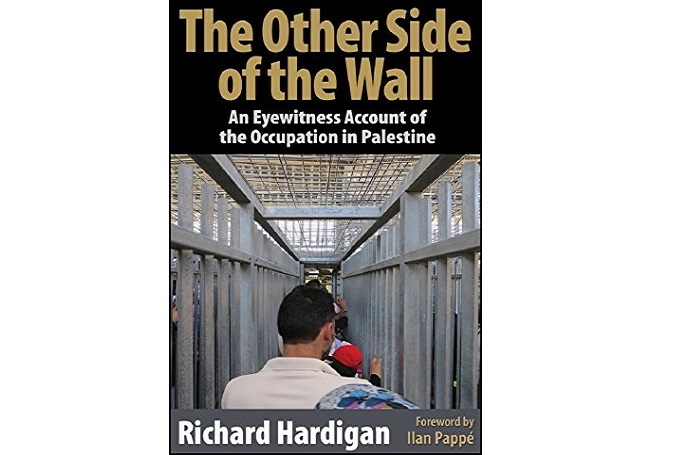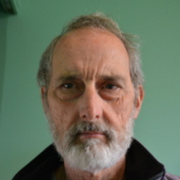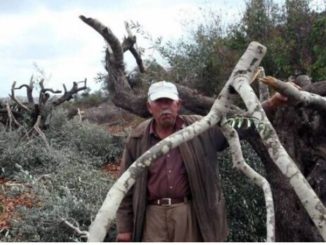
By Jim Miles
(The Other Side of the Wall – An Eyewitness Account of the Occupation of Palestine. Richard Hardigan.Cune Press, Seattle. 2018.)
Four years ago, Richard Hardigan spent the summer months in Palestine as an observer for the International Solidarity Movement (ISM), a Palestinian organization used to witness events within the occupied Palestinian territory. These experiences are witnessed today in his highly evocative book , ‘The Other Side of the Wall’.
It is tempting to say an easy read as it speaks clearly and plainly about his experiences, yet at the same time, the clarity of that message invokes a strong reaction – essentially disgust and anger at the actions of the Israeli police, IDF, and settlers.
Tension is palpable through the book as Hardigan takes the reader on his journey to the sites of various demonstrations and protests.
Using his own experience and the anecdotal histories of the Palestinians he encounters – he does understand Arabic, with an Egyptian accent and not fully fluently – he creates simple basic images of a whole people suffering under the repression of an occupying state and its various agencies.
His experiences demonstrate how no single Palestinian is left unscathed by the torture, night raids, arrests, tear gas, shootings and other violent crimes. At the same time, the daily onslaught of repression is carried out through non-violent but still punitive measures caused by military ad hoc decisions disrupting work, travel – essentially all of daily life.
Underlying the tension is a constant fear. On Hardigan’s part, it is at worst fear of being shot and killed at a demonstration he was witnessing, at best fear of being discovered as an ISM observer then being arrested and deported. It is part of Hardigan’s honesty about his own fears that is a compelling part of the book.
There is no bravado only the same kind of steadfastness that is a necessity for the Palestinians. At the same time Hardigan recognizes that apart from being killed, he can go home, he can go elsewhere, he has a safe place to return to. For the Palestinians he is witnessing for, there is no release, the fear is constant.
At one point during a demonstration towards the end of his stay where several youths were shot using ‘live’ bullets, Hardigan wonders about his own apparent lack of emotion, lack of reaction. He questions whether he has quickly adjusted to the craziness of the situation, whether his emotions have simply blocked out the feelings, whether he knows ultimately that he survived and is ultimately selfishly content with that, that he has lived through another day.
Yet at the same time he reflects on the Palestinians as they too have lived through another day, seemingly unaffected at the occasion of the shootings in order to continue their protest as others are carried away to waiting ambulances. But for the Palestinians, all of them, the pain and the suffering continues. Each day is another struggle, sometimes calm, sometimes sporadically and haphazardly deadly, and other times alive with ongoing protests about the building of the wall, the stealing of the land and the water.
Underneath it all are people that simply wish for peace, and who are warmly accommodating to foreigners, who welcome those who are able to visit, witness, and share in their plight for however a brief time. The few moments of laughter and celebration are always underlined with the anytime presence of Israeli violence.
It is this combination of the author’s own honesty about his reactions to the ongoing violence, and of his clear descriptions and fluent story telling about the violence that make this an invaluable book to present the Palestinian story. It presents little history, with an occasional reference to some historical feature. It focuses on the daily grind of life, the steadfastness of the Palestinians, and the actions that in any other context the western world would jump on as crimes against humanity and international war crimes.
As such it does not require a large amount of background information in order to understand the people’s suffering. The Other Side of the Wall should be a valuable addition to anyone’s library concerned about the situation in Palestine especially those such as myself who have not witnessed it personally; it should be a valuable addition to anyone’s library concerned with the larger contextual situation of human rights and war crimes. In its simplicity and honesty, this is a powerful book.
– Jim Miles is a Canadian educator and a regular contributor and columnist of opinion pieces and book reviews for The Palestine Chronicle. Miles’ work is also presented globally through other alternative websites and news publications. He contributed this article to PalestineChronicle.com.

– Jim Miles is a Canadian educator and a regular contributor/columnist of opinion pieces and book reviews to Palestine Chronicles. His interest in this topic stems originally from an environmental perspective, which encompasses the militarization and economic subjugation of the global community and its commodification by corporate governance and by the American government.







